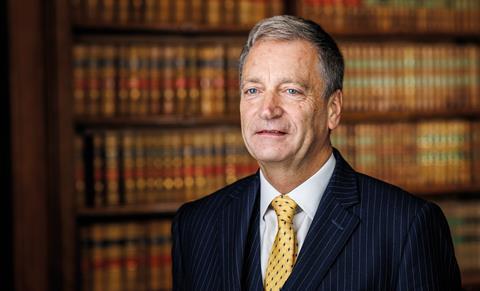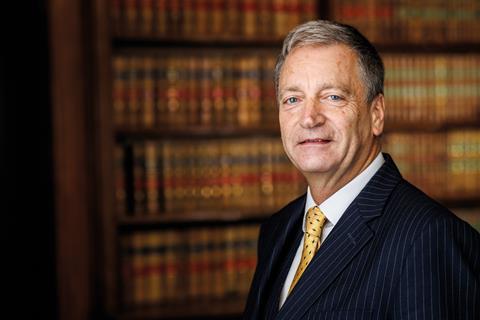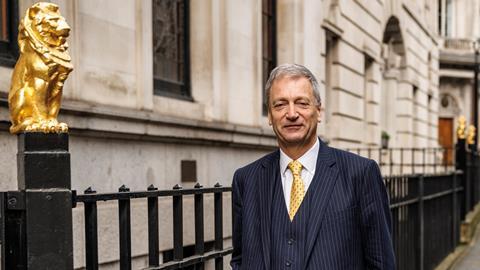Criminal defence stalwart Richard Atkinson will lead the Law Society’s bicentenary celebrations as president in 2024/25. But his principal mission is to help rescue a justice system in ‘dire straits’, he tells Paul Rogerson
BIOG
EDUCATION
Maidstone Grammar School
1983-86: Economics, University of Wales Institute of Science and Technology (now part of Cardiff University)
1986-88: College of Law
1988: articles, Robin Murray & Co, Kent
1990: qualified as a solicitor
CAREER
1990-2013: solicitor and latterly managing partner at criminal defence practice Robin Murray & Co, Kent
2013-present: managing partner of Tuckers’ Kent branch, following Tuckers’ merger with Robin Murray & Co
Specialises in serious and complex criminal cases. Has appeared in high-profile cases including murders, serious sexual offences, fraud and high-value drug cases
2001: higher rights of audience
2016: elected Law Society Council member for Kent
Member, Law Society’s Criminal Law Committee. Committee chair for six years
KNOWN FOR
President of the Law Society, 2024-25
Received special award from Legal Aid Practitioners Group in 2020 for his work protecting solicitors who provided legal advice to suspects detained in police stations during the pandemic

Richard Atkinson succeeded Nick Emmerson as president of the Law Society of England and Wales on Wednesday. But his tenure will not really get going in earnest for another three weeks.
On 30 October, the profession will finally get a proper steer on what a Labour government portends for justice when chancellor Rachel Reeves delivers her first budget.
The auguries are not encouraging, despite Reeves’ pledge that there will be ‘no return to austerity’ under Labour. On 23 September, Channel 4 news anchor Krishnan Guru-Murthy asked Reeves if her ‘no austerity’ pledge ‘includes unprotected departments like justice’, which are thought to be ripe for more real-terms cuts.
Reeves ducked the question, pledging only that there will be no real-terms cut to government spending overall. Next year’s departmental allocations will be disclosed on 30 October, but the following two years will not follow until spring 2025.
‘If you take justice, for example,’ Reeves told Guru-Murthy, ‘one of the biggest challenges is ensuring we build the prisons and the prison spaces… we had to make difficult decisions around prisoner release schemes. We need to build those prisons, build that capacity. So that’s the reform we need to make, the capital investment that we need to make.’
No change there. Or not much change, perhaps. Reeves’ predecessor Jeremy Hunt had already ramped up capital spending by 20% in 2024/25 to bolster the prisons estate, while cutting day-to-day revenue spending by 5%.
Cash for chokey does not seem to be a problem for the Treasury. The problem is that new prisons cannot be built and staffed overnight to accommodate dramatic fluctuations in inmate numbers. Hence the adoption of controversial early release schemes not only by lord chancellor Shabana Mahmood, but also her Conservative predecessor Alex Chalk.
Curbing sentencing inflation has to be the overarching priority, as our own columnist Joshua Rozenberg wrote in these pages last week.
Criminal defence lifer Atkinson, who has spent more than 30 years at the same Kent firm, is more invested than most in the Ministry of Justice’s day-to-day spending. It is the revenue budget that foots the bill for legal aid.
The previous government did not commit to the minimum 15% fee uplift recommended by the Bellamy review, nor did it comment on how it proposed to remedy the grounds on which it was defeated in the Law Society’s High Court battle over fees. Criminal defence practitioner groups have already warned that the new government appears to lack the appetite to invest extra cash.
'We need to rescue the justice system, which is in dire, dire straits. The proof of the pudding will be in the budget and spending review'
Atkinson attended last month’s Labour party conference, but learned little of consequence. In her speech, Mahmood did not even mention legal aid, the courts backlog, the crumbling estate – or even lawyers themselves.
‘I had previously met the shadow front bench team and had the opportunity to meet [Mahmood], the legal aid minister [Heidi Alexander] and a number of other ministers,’ says Atkinson. ‘We continued some of our previous discussions, which, it is fair to say, were encouraging. But I’ve had encouraging discussions with ministers before, only to be disappointed in the end.
‘We need to rescue the justice system, which is in dire, dire straits. The proof of the pudding, as it were, will be in the budget and spending review. The criminal justice system is on its knees. People are leaving in droves. We know that 25% of duty solicitors have left since 2017. A major national firm [Taylor Rose] has pulled out. I know that other firms are in a similar position and contemplating their future.’
He adds: ‘There are 27 duty solicitor schemes with fewer than seven members. The average age has crept up to 50-plus. I know – because it’s happening to me – that as you get older those phone calls in the middle of the night get less welcome. People start to re-evaluate their retirement plans.’
The Law Society this week turned the screw on Mahmood by telling firms to consider scaling back criminal legal aid work or withdrawing from the sector altogether. This reflects anger and bemusement at firms being asked to tender for 10-year crime contracts when legal aid lawyers have no idea what they can expect to be paid.
‘We can no longer ask firms to hold on in the hope of action from government that may never come,’ said Atkinson. ‘We have gone beyond a system that is based on goodwill, and now it is at the limits of financial viability. We recommend firms examine the viability of each type of criminal legal aid work they undertake to decide if they should scale back or withdraw altogether until there is meaningful action by the new government.’
A Ministry of Justice spokesperson responded: ‘The new government inherited a justice system under enormous strain and a criminal legal aid system facing significant challenges. Criminal defence lawyers play an essential role in ensuring that justice is done. While any decision on future government funding is subject to the upcoming spending review, we are committed to working with the legal profession to support the sustainability of the market both now and in the future.’

Governments typically assume there are no votes in justice, Atkinson ruefully tells the Gazette. But this truism may yet prove to be unfounded, if matters continue as they are. The Daily Mail, or the BBC, would certainly like to know which unnamed police force cited by Atkinson in this interview is ‘almost routinely bailing rape suspects for lack of a duty solicitor’.
He adds: ‘Justice is like that fabulous oak tree on the village green that everyone walks past and ignores, but when it falls down there’s an outcry. And actually, it turns out that they did care about it all along.
‘The government has told us how respectful they are of the contribution of parties in the criminal justice system to processing people during the recent riots. How we managed to cope in an emergency situation. Well, that just won’t happen in the future. There won’t be the people there to do it.’
‘Justice matters’ is one of three main themes of Atkinson’s year-long presidency. ‘It has been what has driven me throughout my career,’ he says. ‘You don’t become a criminal legal aid lawyer if you’re motivated by wanting to make a fortune.’
What Atkinson says about criminal legal aid also applies to a civil legal aid system devastated by the 2013 LASPO act. As an interim measure to stabilise this ‘vital public service’, the Society has called for an immediate 20% increase in civil legal aid fees, costing £134m. This should include £17m for early advice in key areas; £4.3m for housing; and £32m for family cases involving domestic abuse, it says.
‘Reports have shown that for every pound spent on legal aid, three pounds is saved in other areas,’ says Atkinson. ‘So there’s an economic case and a social case for civil legal aid. And there hasn’t been an increase in fee rates for 30 years.
‘This funding would go a long way to maintaining access to the civil justice system for communities across the country and help create the space for the review of civil legal aid to resume and finish its work.’
Celebrating 200 years at the Law Society

‘As we celebrate our 200th anniversary in 2025, we should look ahead to what our profession may look like going into the next 200 years, as well as acknowledging those that have shaped the last 200 years. Our bicentenary will be about feeling proud of the Law Society and the legal profession. We want to demonstrate this pride and the impact of the profession on a public platform, engaging and connecting with more members on a regional, national and international level. The president will spearhead the bicentennial celebrations by promoting the Law Society as the voice of the profession in England and Wales and working with members to identify the challenges and opportunities that will affect the future of our profession. He will undertake a presidential tour covering all parts of the jurisdiction, celebrating our bicentennial with a range of members and stakeholders including local law societies, local politicians, and aspiring members. This tour will not be limited to those members practising domestically – the president will ensure that the 200-year celebrations integrate and include our many members living and working outside England and Wales through a showcase of our international work and by hosting roundtables with members based abroad. To celebrate solicitors and their impact, the president will launch a digital exhibition on the history of the profession, looking at what solicitors have accomplished over the past two hundred years, how the role of solicitors has changed, and what the future may hold. By delivering this in partnership with members and colleagues across the Society, the president will celebrate the achievements of our diverse solicitor community across every high street, town and city. His work will cement the role of solicitors as a crucial part of society’s infrastructure and establish the relevance of our profession as we enter the next 200 years of the Law Society.’
Presidential Year Plan 2024/25
Atkinson’s presidency will also coincide with the culmination of the Society’s 21st Century Justice project. The project’s interim report listed ‘actionable simple ways’ to future-proof the justice system in seven key areas of civil law. These include exploring how international models of civil legal aid could work in England and Wales, and how healthcare professionals can refer people with a legal need.
Running in parallel is the Society’s ‘reframing’ project. To build public support and political will for change, ‘we need a long-term shift in how the public and decision-makers feel, think and talk about access to justice and the rule of law’, says Chancery Lane. As president, Atkinson will launch practical tools and advice on how to communicate around law and justice ‘to uphold the rule of law and protect the justice system’.
Semantics, it transpires, are not just semantics.

A second theme of Atkinson’s presidency is Pride in the Profession. Solicitors want to feel good about themselves. The last year has hardly been vintage in this respect. The Post Office Inquiry has been gruesome to behold for those who care about how lawyers are perceived by the wider public.
Professor Richard Moorhead, the leading academic commentator and researcher on the scandal, has been especially scathing. ‘Lawyers are responsible for, not alone but sometimes leading, the grotesque abuse of law that constitutes the Post Office scandal,’ Moorhead has alleged. ‘Their responsibility spans years. It takes in elite lawyers and junior lawyers. Solicitors and barristers.’
The Law Society is not the regulator, of course, but Chancery Lane is working on what is clearly an unmet need among the one in four members who work for corporates, non-profits and public bodies. Atkinson will this year launch an in-house ethics framework, ensuring the Society offers a ‘bespoke offer’ that reflects the diversity of the work they undertake.
So what will this framework look like?
Atkinson responds that the Society aspires to build a ‘support network’ for in-housers that will ‘reinforce the ethical lessons that solicitors learn at the start of their careers’.
He adds: ‘If you are advising a company as general counsel, or you’re part of a department of dozens of in-house lawyers, the demands are very different. But there are challenges that aren’t faced by those in private practice around the external company achieving its commercial objectives, where those will intersect with legal obligations and ethics.
‘Pressure can be brought to bear on in-house lawyers if they are surrounded by those in business with different objectives. There is a risk that their thought processes will become influenced in an unhealthy way, in the sense of crossing ethical boundaries. Solicitors have a strong ethical training. Most of them have a very strong ethical reflex. But if day in, day out, you’re working in an environment where you’re not effectively bouncing ideas and checking your thought processes, it’s very difficult.’
'We can focus and make sure that the membership is aware of their obligations, so that we maintain the highest ethical standards. It’s the defining characteristic of a profession'
Where the Law Society can help is in providing both moral and practical support, he stresses. ‘Where that “ethics reflex” kicks in, where something doesn’t feel right, you may not feel you’ve got anyone to turn to in your working environment,’ says Atkinson. ‘But you have got us. You can pick up the phone. We have got an ethics helpline. We have got individuals who would advise you; we can either connect you or we can give direct advice. And you’re not alone in having to address these issues. You can get some legal support or support from other lawyers that will give you the confidence to say, “we can’t do that”.
‘We can’t stop someone from deliberately doing something wrong that they know is wrong. But what you can do is stop people doing something wrong that they hadn’t appreciated was wrong, because they didn’t understand the situation or they didn’t find the support. We can focus and make sure that the membership is aware of their obligations, so that we maintain the highest ethical standards. And I think that’s really important. It’s the defining characteristic of a profession.’
Concluding on a more upbeat note, Atkinson says that he is most looking forward to highlighting the work solicitors do as the Society celebrates its bicentenary (see box). And not just celebrating the work solicitors do as professionals, or the pro bono work that comes as an adjunct to their day jobs.
‘Solicitors are so important to society, which is not sufficiently appreciated,’ he says. ‘They volunteer for school governorships, they volunteer for charities, they volunteer for all the various organisations that keep small communities going. And they are wanted by these organisations because they are solicitors.
‘That deserves to be celebrated.’

Photographs by Darren Filkins
































No comments yet